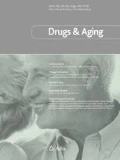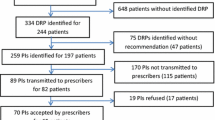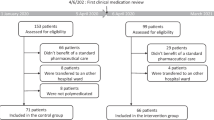Abstract
Background: Clinically significant pharmacokinetic and pharmacodynamic changes occurring with age make older patients more prone to the consequences of inappropriate prescribing. The combination of higher use of medicines resulting from a higher disease burden with suboptimal treatment monitoring results in a higher risk of unwanted drug effects from sometimes inappropriate choice of drugs, doses and durations of treatment. Pharmacy services are increasingly being targeted to minimize the overall number of unnecessary and potential harmful medicines.
Objective: To investigate the impact of a pharmacist-led medication review on quality of prescribing by a healthcare professional team consisting of a general practitioner (GP), care home staff and a pharmacist.
Methods: This observational study compared outcome measurements before and after a pharmacist-led review of medications for patients under the care of a healthcare professional team consisting of a GP, care home staff and pharmacist. The procedure for conducting and recording the medication review consisted of the preparation of a patient medication profile, which combined the patient’s medical records with his or her complete prescription record (current and previous [last 3 years] medication history) and pharmaceutical record (electronic journal entries for the patient over the same period). Laboratory values were evaluated in clinical context. Recommendations for the pharmaceutical plan were discussed at a conference involving the clinical pharmacist and other healthcare team members. Patients were recruited for medication review over the 12-month period 1 April 2003 to 1 April 2004. Medication appropriateness was assessed by an independent panel of clinical pharmacists using the Medication Appropriateness Index (MAI).
Results: A total of 54 patients were eligible according to the inclusion criteria, of whom 24 were subsequently excluded for various reasons; thus, 30 patients were eligible for assessment on the MAI. There was a statistically significant difference between overall pre- and post-intervention summed MAI scores (p = 0.013). The pharmacist identified 115 drug-related problems, and the total number of accepted recommendations was 78 (67.8%). Use of a medication review as an intervention by a clinical pharmacist was associated with an improvement in appropriateness of prescribing.
Conclusion: This study provides evidence supporting the formal integration of a clinical pharmacist into the healthcare team with the aim of improving prescribing appropriateness for institutionalized elderly Dutch patients. Overall MAI scores for all long-term medications used by a group of elderly patients improved significantly after a pharmacist-led medication review. This is an important finding because quality of prescribing is assuming increasing importance as a means of preventing avoidable medication-related harm.




Similar content being viewed by others
References
Dutch Foundation of Hospitals, 2006 [online]. Available from URL: http://www.nvzziekenhuizen.nl [Accessed 2006 Jul 13]
Central Office Statics (CBS). Statline [online]. Available from URL: http://statline.cbs.nl [Accessed 2008 Oct 23]
Tinke JL, Griens AMGF. Facts and figures. The Hague: Stichting Farmaceutische Kengetallen [Foundation for Pharmaceutical Statistics], 2004
Denham MJ, Barnett NL. Drug therapy and the older person: role of the pharmacist. Drug Saf 1998; 19(4): 243–50
Williams BR, Nichol MB, Lowe B, et al. Medication use in residential care facilities for the elderly. Ann Pharmacother 1999; 33(2): 149–55
Turnheim K. Drug therapy in the elderly. Exp Gerontol 2004; 39(11–12): 1731–8
Beers MH, Ouslander JG, Rollingher I, et al. Explicit criteria for determining inappropriate medication use in nursing home residents. UCLA Division of Geriatric Medicine. Arch Intern Med 1991; 151(9): 1825–32
Fick DM, Cooper JW, Wade WE, et al. Updating the Beers criteria for potentially inappropriate medication use in older adults: results of a US consensus panel of experts. Arch Intern Med 2003; 163(22): 2716–24
Cipolle R, Strand L, Morley P. Pharmaceutical care practice: the clinician’s guide. 2nd ed. New York: The McGraw-Hill Companies, Inc., 2004
Hanlon JT, Schmader KE, Samsa GP, et al. A method for assessing drug therapy appropriateness. J Clin Epidemiol 1992; 45(10): 1045–51
Fitzgerald LS, Hanlon JT, Shelton PS, et al. Reliability of a modified medication appropriateness index in ambulatory older persons. Ann Pharmacother 1997; 31(5): 543–8
Kassam R, Martin LG, Farris KB. Reliability of a modified medication appropriateness index in community pharmacies. Ann Pharmacother 2003; 37(1): 40–6
Bregnhoj L, Thirstrup S, Kristensen MB, et al. Reliability of a modified medication appropriateness index in primary care. Eur J Clin Pharmacol 2005; 61(10): 769–73
Samsa GP, Hanlon JT, Schmader KE, et al. A summated score for the medication appropriateness index: development and assessment of clinimetric properties including content validity. J Clin Epidemiol 1994; 47(8): 891–6
World Health Organization. Anatomical Therapeutic Chemical classification system with Defined Daily Doses (ATC/DDD) [online]. Available from URL: http://www.who.int/classifica-tions/atcddd/en/ [Accessed 2006 Jun 24]
Higashi T, Shekelle PG, Solomon DH, et al. The quality of pharmacologic care for vulnerable older patients. Ann Intern Med 2004; 140(9): 714–20
Steinman MA, Landefeld CS, Rosenthal GE, et al. Polypharmacy and prescribing quality in older people. J Am Geriatr Soc 2006; 54(10): 1516–23
Hanlon JT, Weinberger M, Samsa GP, et al. A randomized, controlled trial of a clinical pharmacist intervention to improve inappropriate prescribing in elderly outpatients with polypharmacy. Am J Med 1996; 100(4): 428–37
Crotty M, Halbert J, Rowett D, et al. An outreach geriatric medication advisory service in residential aged care: a randomised controlled trial of case conferencing. Age Ageing 2004; 33(6): 612–7
Holland R, Smith R, Harvey I. Where now for pharmacist led medication review? J Epidemiol Community Health 2006; 60
Salter C, Holland R, Harvey I, et al. “I haven’t even phoned my doctor yet.” The advice giving role of the pharmacist during consultations for medication review with patients aged 80 or more: qualitative discourse analysis. BMJ 2007; 334(7603): 1101–6
Holland R, Lenaghan E, Harvey I, et al. Does home based medication review keep older people out of hospital? The HOMER randomised controlled trial. BMJ 2005; 330(7486): 293–7
Stuijt C, Franssen E, Egberts A, et al. Validation of the Medication Appropriateness Index in Dutch residential home. Pharm World Sci 2008. In press
Sorensen L, Stokes JA, Purdie DM, et al. Medication reviews in the community: results of a randomized, controlled effectiveness trial. Br J Clin Pharmacol 2004; 58(6): 648–64
Williams ME, Pulliam CC, Hunter R, et al. The short-term effect of interdisciplinary medication review on function and cost in ambulatory elderly people. J Am Geriatr Soc 2004; 52(1): 93–8
Rochon PA, Gurwitz JH. Prescribing for seniors: neither too much nor too little. JAMA 1999; 282(2): 113–5
Holmes HM, Hayley DC, Alexander GC, et al. Reconsidering medication appropriateness for patients late in life. Arch Intern Med 2006; 166(6): 605–9
Acknowledgements
The main local insurance company, PWZ/Achmea, compensated participating general practitioners financially for time spent on the study but had no influence on the study design, method subject recruitment or data. No sources of funding were used to assist in the preparation of this manuscript.
C.C.M. Stuijt would like to express her sincere gratitude to all supporting hospital and community pharmacists from the Onze Lieve Vrouwe Gasthuis (E.J.F. Franssen, C.T.M. van der Linden, E.A.F. Haak, G.K.K.E. Thio, M.E. Attema-de Jonge, M.J.H.A. Vanenburg, K.D. Yap, E.L. Sanders) and the Academic Medical Centre in Amsterdam (R.A.J. Kuiper and S.M. Smorenburg) and Ijsselmeerziekenhuizen (Almere and Lelystad) [J. Dijkstra and P.A.M.M. Boermans], all of whom donated an invaluable number of private hours to the scoring of the Medication Appropriateness Index.
The authors have no conflicts of interest that are directly relevant to the content of this study.
Author information
Authors and Affiliations
Corresponding author
Rights and permissions
About this article
Cite this article
Stuijt, C.C.M., Franssen, E.J.F., Egberts, A.C.G. et al. Appropriateness of Prescribing among Elderly Patients in a Dutch Residential Home. Drugs Aging 25, 947–954 (2008). https://doi.org/10.2165/0002512-200825110-00005
Published:
Issue Date:
DOI: https://doi.org/10.2165/0002512-200825110-00005




